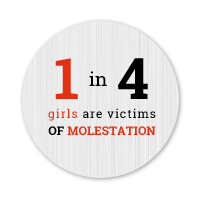 Sex crimes against children are often tragedies of secret and silence. Even the children of the most cautious and watchful parents fall victim to sexual molestation. Although there is no infallible way to ensure your children’s safety and protection from sexual predators, we have created a guide to help you build boundaries and provide additional security.
Sex crimes against children are often tragedies of secret and silence. Even the children of the most cautious and watchful parents fall victim to sexual molestation. Although there is no infallible way to ensure your children’s safety and protection from sexual predators, we have created a guide to help you build boundaries and provide additional security.

What is child sexual abuse?
Child sexual abuse comes in many forms – it is not only physical manipulation, but it can be noncontact mental and emotional abuse. Though there is no universal definition of sexual abuse, the American Psychological Association has outlined common forms that it can take:
- Fondling
- Any type of genital contact
- Exposure
- Voyeurism
- Verbal pressure of sex
- Inappropriate kissing
- Child pornography
Get Real. Understand the startling statistics. Every parent needs to recognize that this very well could happen to their children, even when they take vast strides to ensure that it won’t.
- Approximately 300,000 children are sexually abused in the United States every year.
- One in four girls is sexually abused before the age of 18.
- One in six boys is sexually abused before the age of 18.
- 90% of adolescent sexual abuse victims knows their abuser.
- Children are most vulnerable to sexual abuse between the ages of 7 and 13.
- 73% of child sexual abuse victims don’t tell anyone about the abuse for at least one year.
- 45% don’t tell anybody for at least 5 years.
- A child who has experienced sexual abuse or attempted rape is more than 13 times more likely to experience rape or attempted rape during their first year in college.
Instill Knowledge, Not Fear. Foster two-way communication between you and your children. Teaching your children through paranoia will only lay the path for a future of social awkwardness, intolerance, closed-mindedness, confusion and apprehension when it comes to friendships and romantic relationships. 
We all have a friend or family member who was raised to be afraid of strangers, and now has an unhealthy fear of interpersonal relationships and the unknown. You want your child to be aware of warning signs, not to blindly fear certain types of people.
At the same time, refrain from teaching your children to always be welcoming to strangers. Telling your child to always “give him a hug” can instill false trust. Instead, allow your child to express emotions on his or her own terms.
Teach the Do’s and Don’ts.
- Don’t ever get into the car with a stranger.
- Never go to a second location with someone you don’t know.
- Don’t ever let an adult swear you to secrecy.
- Don’t give away personal information to a stranger.
- Do stay close to a friend.
- Do tell mom or dad where you are and where you will be.
- Do talk to a trusted adult about anything that makes you uncomfortable.
Educate your child about basic sexual education. Helping your child understand his or her own body will give them the power to embrace and protect it. Teach them that no one should touch their private parts. If you are uncomfortable having “the talk” a healthcare professional can be available to assist you.
Trust Your Gut. Don’t write off your suspicions as you being an overprotective parent. If something isn’t sitting well with you, it isn’t likely that you are overreacting or reading too much into behavior. If you get a bad vibe from an adult that your child is spending time with, monitor that time spent and delicately ask your child questions about their relationship in a non-accusatory manner. 
While your child is bound to build meaningful relationships with teachers, coaches and neighbors, it is important to recognize when a line has been crossed. Take note of excessive time an adult spends with your child – This is typically the first step in the process of manipulation.
If your child tells you about a “special friend” with whom he or she keeps secrets, alarms should go off in your head. Beware of your child receiving money or gifts from an adult, or getting personal calls or text messages. Predators often integrate themselves into the lives of a target’s family in order to become a trusted member with easy access to the child. The perpetrator will groom the entire family, gain their trust and then begin to push boundaries.
Check Yourself. The following is a list of rules that you can live by to protect your children from sexual predators:
- Never leave your young children alone in a public setting.
- Be sure your children know where they are going to be picked up after school or extracurricular activities, and by whom. If your child takes the bus home or gets a ride from another student, to be dropped off at home alone make sure they know to keep the doors locked.
- Teach your children to memorize your cell phone and work phone numbers, their home address as well as emergency numbers.
- Do not purchase clothing or jewelry for your child that displays their name. As trendy as this may be, it gives perpetrators a free pass to pretend as though they know your child personally. “Hi Jackie, I’m your Uncle Johnny. Don’t you remember me?”
- Set up a code word or phrase for your child in case of an emergency. If someone your child doesn’t recognize has to pick him or her up from school and knows the code phrase, your child will understand that it’s safe to go with them.
Know the Warning Signs.
The following are common indications of sexual abuse:
- Excessive knowledge of sexual activities for your child’s age
- Sudden changes in behavior – mood swings and/or withdrawn conduct
- Your child is always watchful and on edge, as though in fear that something might occur at any time
- Night sweats with screaming or shaking; Night terrors
- Loss of appetite or change in appetite
- Inability to explain bruises or other injuries
- Refusal to be alone with a certain person
- Sudden refusal to go to school or some other recreational activity
- Your child has unexplained money, gifts or toys
- Develops a warped self-image or body-image
 Have a Plan for the dreadful scenario in which your child goes missing. According to the Department of Justice 74% of children murdered by non-family members are killed within the first 3 hours of abduction, and it generally takes about two hours for parents to gather all the information law enforcement officials need to head up a successful search. Always carry up-to-date photos of your child that accurately depict his or her appearance. Get your child fingerprinted. Many police departments offer this service free of charge.
Have a Plan for the dreadful scenario in which your child goes missing. According to the Department of Justice 74% of children murdered by non-family members are killed within the first 3 hours of abduction, and it generally takes about two hours for parents to gather all the information law enforcement officials need to head up a successful search. Always carry up-to-date photos of your child that accurately depict his or her appearance. Get your child fingerprinted. Many police departments offer this service free of charge.
Get Help if your child has been sexually abused. Long-term effects of sexual abuse include depression, guilt, fear, post-traumatic stress disorder, anxiety disorders, anorexia, substance abuse, destructive behavior, sexual dysfunction and criminality in adulthood. To prevent a devastating future, parents of victims are urged to engage their child in some type of therapy. There are various different types of counseling victims can seek. They include:
- Individual therapy
- Family therapy
- Group therapy
- Trauma-focused cognitive behavioral therapy
- Child-focused therapy
American Professional Society on the Abuse of Children
http://www.apsac.org/
National Center for Missing and Exploited Children
http://www.missingkids.com/
Child Help USA
http://www.childhelpusa.org/
Prevent Child Abuse America
http://www.preventchildabuse.org/index.shtml
Child Welfare Information Gateway (formerly National Clearinghouse on Child Abuse and Neglect Information)
http://www.childwelfare.gov/
Cyber Sexual Predators
In today’s world with global communication available at the fingertips of anyone who has access to a computer, it is especially important to understand how to spot and stop predators. Sexual perpetrators use the perceived anonymity of the Internet as a playground for picking up underage boys and girls. They use the computer screen as a cushion that makes children more open and less apprehensive about forming new relationships with strangers. They trick young minds into sharing secrets about themselves, with the ultimate goal of becoming intimate with them. 
Startling statistics: One in five American teens that regularly use the Internet has received unwanted sexual solicitation. One quarter of children have been exposed to unwanted online pornographic material. Only 25% of children who receive unwanted online sexual advances tell an adult.
Parental Controls: Currently, only one-third of households with Internet access are actively using software to protect their children and teens from predators. Filtering and blocking software like Net Nanny, CYBERsitter and Cyberpatrol allow parents to decide who is appropriate for their kids to talk to online. Games: There are dozens of web sites dedicated to finding fun ways to educate children and teenagers about the dangers of sexual predators.
- The National Center for Missing and Exploited Children (NCMEC) offers online safety quizzes at www.missingkids.com.
- McGruff.org and IDthecreep.com have games to teach kids how to identify online predators.
- Wiredkids.com uses superheroes and cartoons to keep the attention of kids while teaching them about online predators.
Rules to Establish Child-Computer Safety:
- Keep the computer in a common room.
- Educate children about online predators.
- Create a family email address for children to use, not their own personal one.
- Check to be sure that all of your teenager’s Facebook “friends” are people that they know in real life.
- Teach your child never to enter a private chatroom.




No Comment